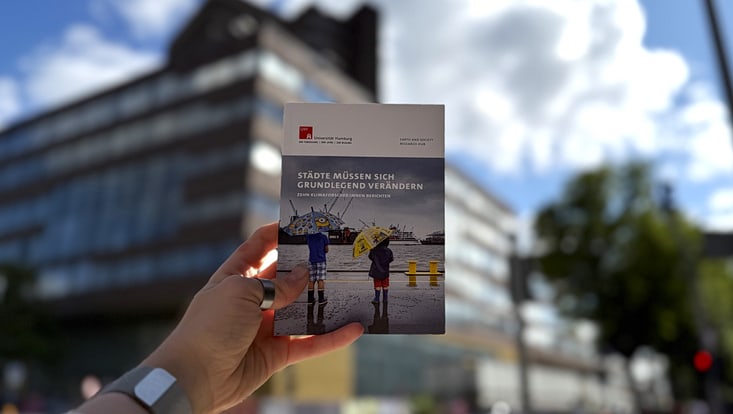High Levels of CO2 Emissions Reduce Company Value
15 November 2013, by Franziska Neigenfind

Photo: UHH/CEN/S. Janssen
News from Climate Science: Once a month, climate researchers report on their latest findings in the newspaper "Hamburger Abendblatt." Alexander Bassen investigates how the emissions trading system affects firm values.
Since the introduction of the European emissions trading, CO2 has had its price: Companies with particularly high emissions have to buy emissions certificates – that is the right to emit CO2. Climate-friendly companies, however, can sell certificates, thus making additional profits.
But does emissions trading really change anything for companies? Theoretically, CO2 certificates are meant to provide an incentive for more climate-friendly production. However, this only works when they prove to be a profit or a loss – if emission allowances are too cheap, the incentive gets lost. It is also a problem if the companies simply pass on their increased CO2 costs to consumers. Then, the customers pay the price for excessive emissions. As scientific studies have shown, this is the case in the energy sector.
At the KlimaCampus, my colleague Nicolas Koch and I have examined for the first time whether CO2 emissions do influence the value of companies. In contrast to annually published balance sheets, the company value also reflects expectations for the future. If the company is well-prepared for future challenges, which may arise from climate policy, this allows for good conditions for a high value. In order to calculate this, we have looked at several major providers: What kind of electricity mix does the company produce? Carbon, gas or renewables? How modern are its power plants? We were particularly interested in the question whether investments in low-emission technologies would pay off.
New power plants: Does the switching pay off?
This is a question electricity providers are asking themselves right now because many plants are old and have to be renovated anyway. Since power plants are designed for a long life span and their new construction is very cost-intensive, investment decisions have to be carefully considered. It is also important that, in future, companies will receive less free certificates and more certificates will be auctioned. In addition, it is intended to abolish the so-called grandfathering: How many free certificates a company will receive will be no longer calculated on the basis of its former emissions. Instead, the new basis will be CO2 savings, which the company could achieve by using climate-friendly technology. Both measures will lead to CO2 certificates becoming more expensive.
In our study, we have analyzed data from more than 450 power plants and simulated two scenarios: What happens if providers replace their old plants with plants of the same type? And what happens if they invest in low-emission technologies instead?
The companies´ self-defined emission targets served as our calculation basis. Additionally, we have incorporated some further factors into both scenarios, such as commodity prices, plant life and increase in CO2 prices. The result: The company value suffers clearly when emissions are too high. In 2020, the value of companies who take their emission targets seriously will be 26 percent higher than when failing to reduce emissions, due to the expected price development for CO2 certificates. In other words: Investments in low-emission power production are not only climate-friendly, but make good economic sense, provided that the statutory provisions continue to be stable.


